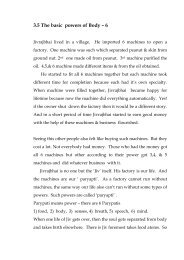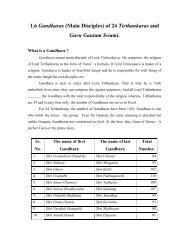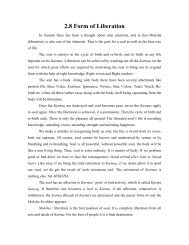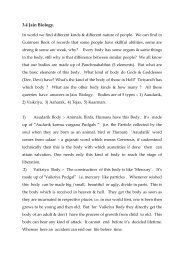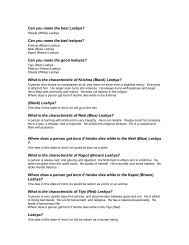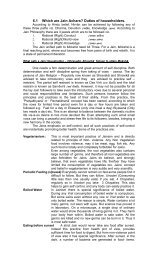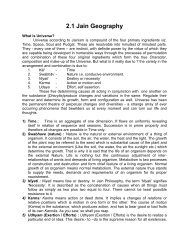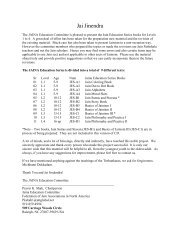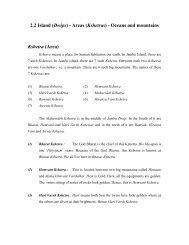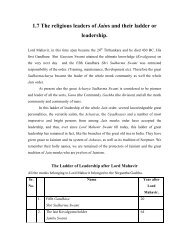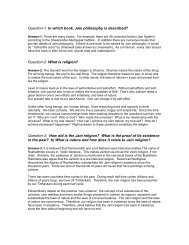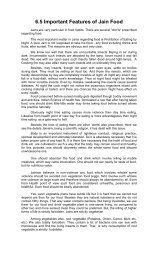Paryushan Parva - Jainism, Jain Religion - colleges
Paryushan Parva - Jainism, Jain Religion - colleges
Paryushan Parva - Jainism, Jain Religion - colleges
Create successful ePaper yourself
Turn your PDF publications into a flip-book with our unique Google optimized e-Paper software.
Pratikraman in English with Meaning<br />
Going Back to the Path of Purification<br />
on the stand (bookself). I might have used the religious book as a pillow, or touched it with my<br />
foot. I might not have taken care of it. I might have misinterpreted, laughed at, or ignored the<br />
words of the scripture, because of obstinacy, wrong insistence, impudence as well as evil intention,<br />
caused by perversity.<br />
If I have indulged in any of the above faults or lapses by physical, verbal or mental activities,<br />
directly or indirectly, then I pray that my such faults be dissolved. TASSA MICHCHHÄ MI<br />
DUKKADAM.<br />
Lesson 7 – Observation of Right <strong>Religion</strong> (Perception):<br />
I reflect on and confess the wrong-doings (Atichär), if any, related to observing the right perception.<br />
Some of the common wrong-doings (Atichär) are:<br />
(1) To doubt the words of the Jina.<br />
(2) To wish for a false course.<br />
(3) To doubt the fruits of one's religious actions.<br />
(4) To accept (or be impressed by) the wrong philosophy and to praise it.<br />
(5) To maintain relationship with people who promote wrong philosophy.<br />
I might have asked for a worldly favor before a guru or Tirthankar. I might have considered a good<br />
monk to be evil and vice versa; a duty as non-duty, non-duty as duty; and an evil path to be the right<br />
path and the right one to be the evil. I might have contradicted or looked down on or offended a<br />
righteous person.<br />
If I have indulged in any of the above faults or lapses by physical, verbal or mental activities,<br />
directly or indirectly, then I pray that my such faults be dissolved. TASSA MICHCHHÄ MI<br />
DUKKADAM.<br />
Lesson 8 - Non-Violence (Sthul-Pranätipat-Virmanvrata)<br />
First partial Vow (Anuvrat 21 ): abstaining from intentionally injuring mobile living beings, through<br />
the activities of mind, words or body, in any of the two ways- directly or through somebody is<br />
called Sthul-Pranätipat-Virmanvrata or Ahimsänu-Vrata. Shrävaks cannot stop but can minimize<br />
Himsä of immobile living beings, therefore, they are excluded.<br />
I might not have considered Ahimsä as the key element in the whole scheme of the ethical discipline<br />
of the Shrävak and the monk. I might not have given protection or expressed my compassion to<br />
mobile living beings. I might have intention to cause injury, might have attempted to cause injury or<br />
might have inflicted injury to mobile living beings because of my passions or carelessness. I might<br />
have unnecessarily wasted the five immobile living beings like earth, water, fire, air, and plants; or I<br />
might have committed similar acts.<br />
21 Vrata is derived from the word “vru” meaning to select or to choose. Therefore, the Vrata means the type of the<br />
selection for renunciation. Vrata depends on: 1) selection of the type of conduct to be practiced, 2) knowledge of what<br />
is the right conduct and what is the wrong conduct and 3) how much energy one can use for the right conduct.<br />
Therefore, Vrata is to retire from the wrong conduct like violence, non-truth, stealing, sensual pleasure and<br />
possessiveness by body, mind and speech; and to get engaged in the true religious activities by body, mind and speech.<br />
We do not take Vrata to please any divine powers or any one else. We take Vrata to continue and enhance the process<br />
of liberating ourselves, to purify our selves and to achieve the salvation (Moksha). The complete renunciation of all<br />
worldly attachments is called Mahävrata [Complete (great) vows], practiced by our Sädhus and sädhvijis, and the<br />
partial renunciation of worldly attachments is called Anuvrata, practiced by Shrävakas and Shrävikäs.<br />
19




